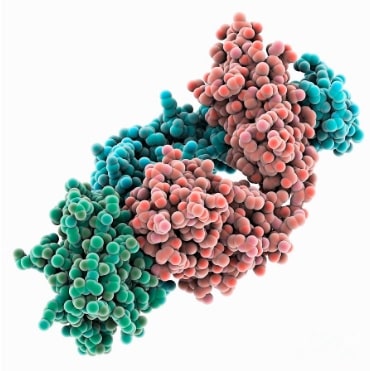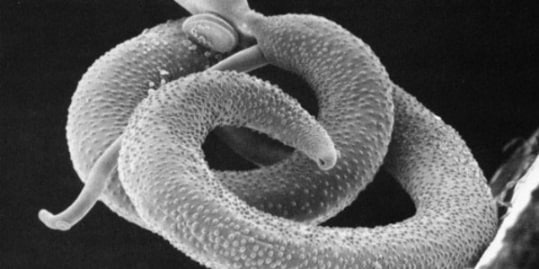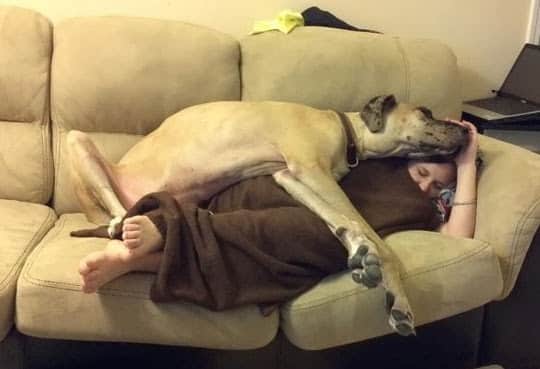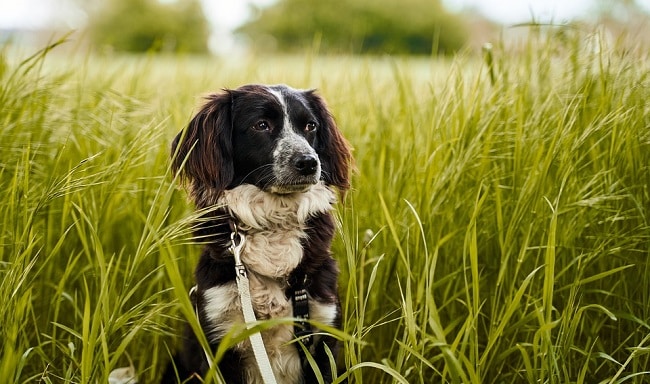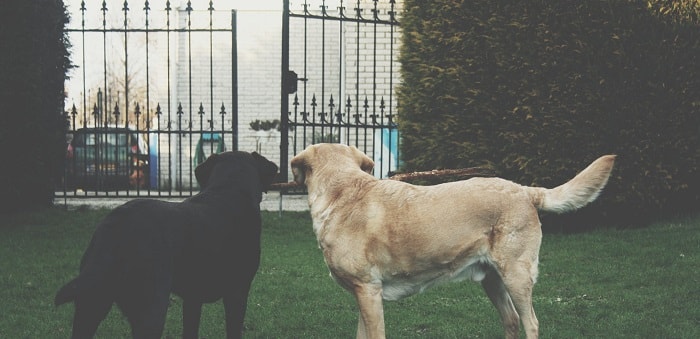Read this article and find out if Great Danes are hypoallergenic and other important Great Danes health questions.
Just how hypoallergenic are Great Danes?
When you are thinking about getting a Great Dane as new dog, or taking care of an existing one, one of the key phrases we hear from users if you are doing a search is “are Great Danes hypoallergenic dogs?”. A Great Dane is not a Sausage Dog – it is a big dog. The clue is in the name ‘Great’ and a big dog can come with big issues you need to be aware of. You want the best for your pet, you don’t want to break the bank being a dog owner and you want to be healthy yourself.
What do we mean by Hypoallergenic?
Allergies are when the body has an allergic reaction. That’s when your immune system goes into attack mode, even when it is something relatively harmless, like pollen, milk or peanuts. Some scientists believe that allergic reactions are caused by a long-term lack of exposure to parasites or other nasties. Since there aren’t any real illness-causing agents for the immune system to go to work on, the immune system goes a bit haywire and accidentally starts to attack similar-looking, harmless stuff in the general environment, with special ‘weapon’ molecules called immunoglobulin E antibodies.
In the ensuing ‘battle’ between your antibodies and these harmless proteins etc., some parts of your body can become a battlefield and that’s where you see rashes happening, soreness, swelling, sneezing and so on. That’s why some scientists and doctors say it is OK for young kids to get a bit grubby and mess about outside etc. That’s a safe chance for their still-developing immune system to have some low-risk practice battles, and to build up resistance that will keep your kids healthy later on in life. So a few upset tummies when they are two might be a good thing, in the long run. That’s a big topic and we aren’t going to look at all the science here.
The term Hypoallergenic doesn’t have a strict generally agreed and consistent medical definition. It is generally accepted to mean something that typically produces somewhat fewer allergens than other things in the same category that produce more.
In the case of dog breeds, Hypoallergenic means that they still produce some amounts of allergens, which can affect the humans living around them but because of their fur type, or maybe an absence of thick fur, or the fact they don’t shed fur much, or the absence of a certain type of gene that produces a specific protein that can trigger human allergies, these breeds typically produce significantly less human affecting allergens than some other dog breeds. Put simply, allergy-prone owners who have a propensity to eczema, bronchitis, skin rashes, asthma or other severe allergies and asthma may in some cases, some say, be much less affected by a ‘hypoallergenic’ dog than a ‘normal’ one. At least that’s what some websites claim.
Anyone who has even a relatively mild allergic conditions (like mild hayfever) knows the irritation and inconvenience allergies can cause. Of course, there are also some quite dangerous allergic reactions where people can get really seriously ill.
Allergy causing Grass Pollen. Image courtesy Laguna Design
Kids bodies need to practice beating real nasties when young. Image courtesy The Scientist
So, are Great Danes Hypoallergenic?
There is no simple answer to the question “are Great Danes hypoallergenic dogs”. We already saw that there is no clear agreement on actually what we mean by ‘hypoallergenic’. It can vary between people and it may vary between individual dogs too.
We have to break down the question a little more to get a reasonable and sensible answer. Great Danes (like almost any Dog) produce several things that might be the source of an allergic reaction:
1. Dander (Dandruff)
Dander is tiny flecks of skin, produced by dogs or other animals that have fur. Sometimes it is even microscopic in size and can float in the air. Dander can cause reactions in people who are specifically allergic to these kinds of triggers. Note that the very fine types of dander can be inhaled and cause lung inflammation.
2. Saliva (Slobber)
There are proteins found in dog saliva that also cause a reaction. The proteins are there even after the saliva dries out,
3. Urine and feces
Dog urine and feces are a whole mini-factory of bad stuff that can cause all kinds of problems for the humans who live with them (not just allergic reactions). Also, dust from dried feces can be suspended in the same way.
4. Dog Hair
Most dogs have hair, and most dogs shed quite a lot of that hair. Dog hair is another allergen for some people. Some breeds have very much less hair than others and some shed less than others.
Because of their tiny – even microscopic size, dog allergens will stick to almost anything, including unwashed towels, clothes, curtains, carpets, furniture, sheets, cushions, pillowcases, bedding, fabrics, and many items which carried into and out of the home, like bags, coats, dog leads. That means dog dander is very easily spread throughout the home and also outside to cars, schools and even hospitals.
Dog dander and other dog allergens can even be found sometimes in homes and other buildings without a dog.
So, you might read some convincing sounding articles claiming that some dog breed or other is Hypoallergenic. This is a complete myth and unscientific. Maybe some breeds are a bit less of an issue with hair but all dogs, irrespective of breed, produce potential allergens. This includes the Great Danes as a breed.
How to deal with Dog Allergens
There are some simple measures that allergy – prone people can take. The first is if you have severe or even dangerous reactions, just don’t have a dog. Even months after a dog leaves a home, there are often still dog-created allergens in the building, in the form of dust. Some people say ‘hey, there’s no dog here now but I am still getting reactions’. This is because unless the home is really thoroughly purged of absolutely every bit of dog dust, you might still run into it somewhere.
For homes with sensitive individuals where you do want a dog – Great Dane or otherwise – there are some sensible steps you can take.
If your dog stays in the home, you should keep it out of all bedrooms, especially of anyone who has asthma or other allergies. Do not allow the dog to get up onto furniture, especially a sofa or anything with upholstery, and keep the dog away from rugs or carpets (except their own). Ideally have washable floors in areas the dog is allowed in, like linoleum, tiles, wood, laminates, etc. and thoroughly wash them very regularly.
Keep your dog clean (OK we know that’s only possible up to a point) but most importantly clean the home very often and very well and do not allow any dog dust to accumulate. That’s the minimum. Better still, put in a pet gate to stop your dog getting into rooms with a lot of carpet and fabrics and do not allow your dog to sleep on the sofa or on your bed. Yes, we know on a cold night or sitting watching TV on the sofa, dogs are a great companion and if that works for you – great. But don’t put your health at risk if it doesn’t. Also think about what’s a good diet for them to keep their coat (fur) healthy.
Images courtesy Peggy Seeger and The Paws
Conclusion: It’s not about the breed – it’s about you
For most people, it really doesn’t matter what breed they choose, they will not get an allergic reaction in any case. You want to sleep on the couch with your Great Dane then go for it.
Image courtesy cutefunnyanimalz
For those people who do get an allergic reaction, some dog breeds might be slightly less of an issue than others due to the hair (or lack of it) but no dog is allergen-free. The important point is what the owners do to keep their dogs in the right conditions and especially around controlling where the dog is allowed to go and overall home hygiene
So, what do you think about the question “are Great Danes hypoallergenic dogs” now? Leave your thoughts in the comment section below! Share the article too and see what your friends or family think. We hope this has given you plenty to think about.

